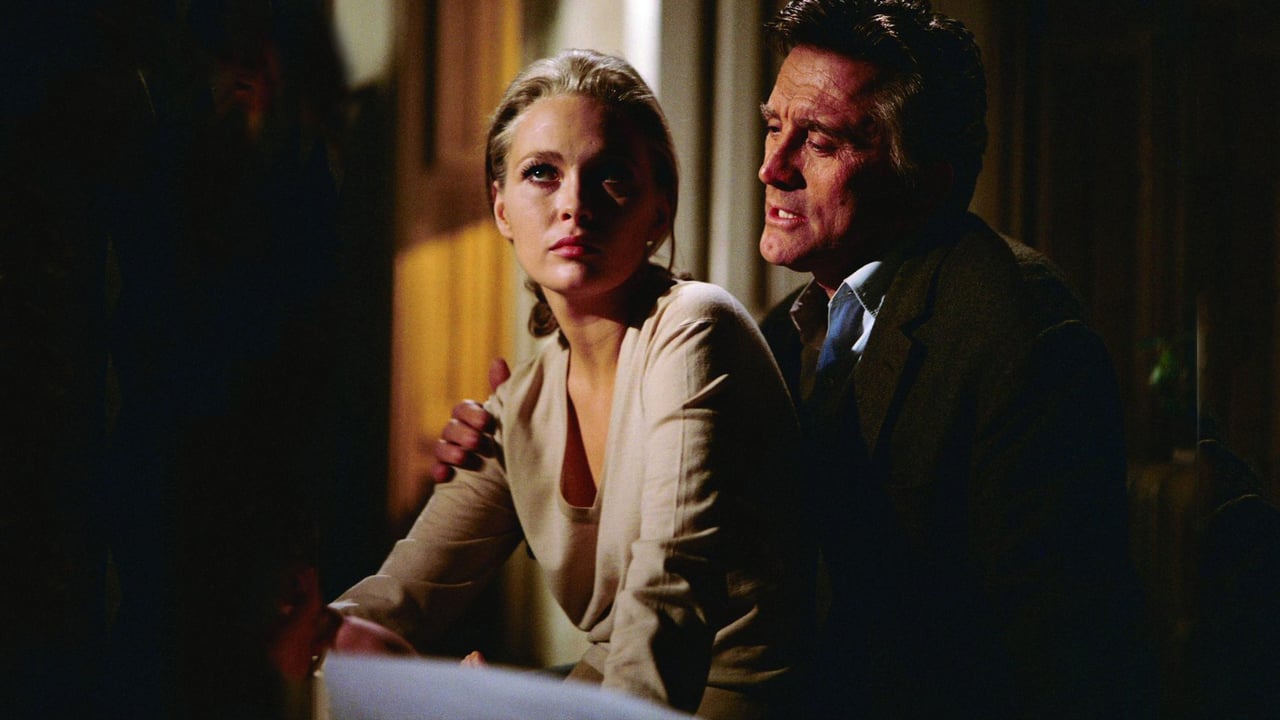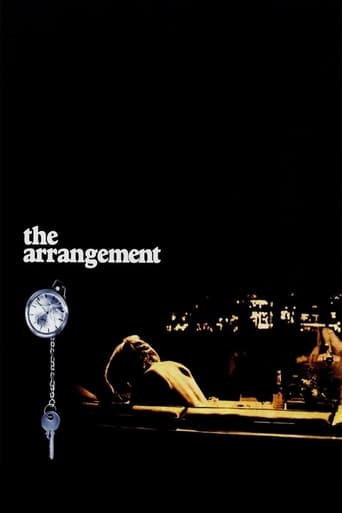

Clever and entertaining enough to recommend even to members of the 1%
... View MoreA film with more than the usual spoiler issues. Talking about it in any detail feels akin to handing you a gift-wrapped present and saying, "I hope you like it -- It's a thriller about a diabolical secret experiment."
... View MoreWhile it is a pity that the story wasn't told with more visual finesse, this is trivial compared to our real-world problems. It takes a good movie to put that into perspective.
... View More.Like the great film, it's made with a great deal of visible affection both in front of and behind the camera.
... View MoreIt's ironic that Kirk Douglas's frequent co-star Burt Lancaster starred in a similar drama about a corporate executive's mid-life crisis (the origins of this term now used frequently for such men?) one year earlier titled The Swimmer (1968). Both films are unusual, introspective and lack wide appeal, the latter being superior to this overlong melodrama that was based on the popular novel by Elia Kazan, who also produced and directed it; still, it contains a certain truth if one is patient enough to wait almost two hours for it.The movie is rated R for several snippets of nudity, mostly at a distance and/or through sheer curtains except for a beach scene featuring Douglas with his character's mistress, second-billed Faye Dunaway, who each cover up the other's most private parts with their hands. It's interesting to note that frequent on screen "bad girl" Dunaway would earn her only Best Actress Oscar seven years later playing a similar role as network executive William Holden's muse- mistress in Network (1976).Eddie Anderson (Douglas) is a rainmaker advertising executive that appears to have everything going for him including a beautiful loyal wife Florence (Deborah Kerr) who tolerates his extramarital indiscretions, though she realizes that her husband's relationship with Gwen (Dunaway) was something more than just a physical one. Gwen had helped Eddie realize that he'd sold his soul to the devil for his multimillion dollar client, a tobacco company whose cigarette advertisements play constantly on every radio and television station. So, not liking who'd he'd become, Eddie attempts suicide. He survives and then refuses to go back to work; his wife thinks it's all about Gwen, but at that point Eddie hadn't seen her for more than a year. His mistress had become too demanding, so Eddie had discarded her when she'd refused to be controlled by him.The plot develops slowly and the story is told out of sequence at times, featuring odd and intentionally comical edits, but we eventually learn about Eddie's other demons. For instance, his immigrant father Sam (Richard Boone) had been a successful merchant that fought with Eddie's mother over her son's education. Sam had always wanted Eddie to assume the family business but his protective mother had sent him to become college educated instead.But as Sam is dying, Eddie is the one that his father wants by his side. He's reunited with Gwen, who's living with a dependable man that protects her (though she gets her sex elsewhere) and her newborn child, which looks a little like Eddie. Additionally, the Anderson's lawyer Arthur (Hume Cronyn) manipulates Eddie during his vulnerable time to gain financial advantage for Florence, for whom the lawyer carries a secret torch. There are other characters, but most will recognize Harold Gould plays Florence's therapist Dr. Leibman and Michael Murphy as the "last rites" Father Draddy.
... View MoreEddie Anderson (Kirk Douglas) is rich, successful and losing his mind. You can tell this because as he's driving to work in his fancy convertible, he deliberately smashes his car--nearly killing him. Following this, he's distant and uncommunicative--slipping deeper and deeper into a fantasy world. He's dreaming of his lover (Faye Dunaway)--a woman who left him a year and a half ago. In the meantime, his wife (Deborah Kerr) is beside herself--she has no idea what to do. Through the course of the film, you see a man on the edge of sanity--a man having perhaps the world's world mid-life crisis. Because he's reached this age and hates who he is and what he's become--that's why this crisis is so intense.While I felt this was a painful and unpleasant film (much of it because you don't like ANYONE in the film--especially the leading man), this is not to say the picture is without merit or style. Director Elia Kazan (from his novel) creates a bizarre portrait of a man in crisis--and does it in very, very strange and creative ways. Very often through the course of the film, it becomes more and more difficult to determine what is real and what is not--and Douglas' character has conversations with himself (using a split screen), walking back in time to his childhood and examining his relationship with his parents and even runs around in the buff! It's all very artsy, surreal and strange--though not exactly something I enjoyed. It's also very adult and a film that most folks would find challenging at best, though the film would probably speak best to someone in mid-life--someone who is questioning who they are and what they are. Strange to say the least--and more like an Ingmar Bergman film than one you'd expect from Kazan. In fact, I liked the film's style much more than I liked the actual story. Worth seeing as a failed but intriguing experiment.By the way, the clip of the father on the boat coming to America is from another Kazan film, "Amerika, Amerika" (1963).
... View MoreHow do you sugar-coat Cancer? Eddie Anderson (Kirk Douglas) does it by claiming the 'Zephyr' brand of cigarette (made by his ad company's million-dollar client) is CLEAN. Eddie has gotten rich by selling cigarettes, by selling Cancer (a word he goes out of his way to avoid saying), by saying cigarettes are CLEAN.That's why Eddie is unhappy, alienated, suicidal, and DIRTY.Elia Kazan (and yes, I too have conflicted feelings about the man) makes a film that shows an ad genius who gets rich and powerful, but he's guilt-stricken, and he takes himself down, even tries to take himself out.They still had cigarette advertising on radio and television back in 1969 (when this film was made), and you hear similar ads occasionally in this movie, extolling the pleasures and wonders of 'Zephyr' cigarettes, with copy written by Eddie Anderson himself... you heard those ads repeatedly, on Eddie's car radio, just before he drove his convertible sports car under the wheels of a tractor-trailer.It is a screed against advertising and selling cigarettes, wrapped in the mid-life crisis of a man who does just that, and it causes Eddie to walk away from his fabulously high-paying gig as an ad genius, in the process laughing right in the mortified faces of the cigarette company executives, telling them essentially "I can't do it anymore, I can't sell Cancer anymore."I give it nine stars, reluctantly taking one star away, due to what seemed a too fast narrative between the scene where Eddie has a serious and honest conversation in a hotel room with his wife (Deborah Kerr), which suddenly gets violent, and in the next scene he's appearing before an inquest of some kind, with his arm in a sling, and I wondered if he was hurt in the struggle with his wife, only to learn he was shot, TWICE, at the apartment of Gwen (Faye Dunaway), by the somewhat creepy Charles standing scarily in the shadows, followed shortly by a scene showing Eddie burning down his house.The speed of the narrative at that point almost gave me whiplash. I also thought it caught a little bit of the hip (hippie) look of the late sixties, primarily in Gwen's poster-decorated apartment.
... View MoreBeing well past middle age, it's fascinating for me to watch films about middle-age that were made during my adolescence. I come to them hoping to get a clearer understanding of themes and concerns that I would have had no idea about at the time. This is not necessarily the case with Elia Kazan's "The Arrangement." At age 60, director and writer Kazan really really thinks he is saying something deep and profound about the emptiness of The American Dream, and attempts to do it with a candor he was not afforded in his earlier (better made) films like "A Streetcar Named Desire " and "Splendor in the Grass." Unfortunately in "The Arrangement" Kazan has the cinematic tools of the Now Generation working like a Trojan to put over a very old-fashioned story. No amount of nudity, quick cutting, raw language and clever juxtapositioning of fantasy and reality can breathe new life into this tired tale of a rich and successful ad exec (Kirk Douglas his chin doing all the acting) who finds out at age 45 that all he has acquired "Isn't enough." Were this the only film made in the 60s about the subject, perhaps it would have played better, but the late 60's and early 70's were jampacked with one movie after another about the same suburban ennui, and by comparison "The Arrangement" with its rather misogynistic undertones and off-puttingly distasteful protagonist, comes off as REALLY old-fashioned.The pleasures to be found for me now are the reminders of what a beautiful and electric actress Faye Dunaway used to be. As the mistress, Dunaway is saddled with one of those male-fantasy roles of a woman who embodies all that men are drawn to and are afraid of. Cast as "The Redeemer of lost male souls", her character has no job to speak of, no goals, no shattered dreams of her own she just wants to be wanted by a man. Poor Deborah Kerr is really wonderful as the wife, but she spends most of the film chasing after the disinterested Douglas. Her character speaks of love, but one senses that Kazan thinks she is there for the money and security. Kazan seems unable (or unwilling) to entertain the notion that being the wife or mistress to a self-involved lout may not have been the fulfillment of The American Dream for either of these women either.Though I enjoyed the film's glossy shooting style, period clothes and dated attempts at social commentary (Look! TV's in every room! Look! Commercials are everywhere! Look! The only ethnics these people come into contact with are the hired help!), I about had it when the film attempted to romanticize Douglas' comically loud-mouthed brute of a father. His death is seen as the end to a certain kind of male pride after seeing him smack around his wife and tear up the son's college application, death seemed like good riddance to me.Though it is painfully clear that "The Arrangement" is Kazan revealing deep deep truths about how he sees life, alas, in 2010 and at middle-age myself, the film had nothing to share with me. It was beautiful to look at but as emotionally superficial as if it were a movie made by the SPIKE TV network.As a final note: Kirk Douglas is an ad exec in this film. As of this writing TV's MAD MEN is a big hit...just goes to show you that the media NEVER seems to tire of using the advertising industry as a metaphor for American artificiality. Zzzzzzz
... View More